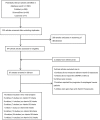Dietary vitamin B intake and the risk of esophageal cancer: a meta-analysis
- PMID: 30464635
- PMCID: PMC6225909
- DOI: 10.2147/CMAR.S168413
Dietary vitamin B intake and the risk of esophageal cancer: a meta-analysis
Abstract
Background: Several epidemiology studies have explored the association between dietary B vitamins' intake and the risk of esophageal cancer (EC). However, the results remain inconclusive. Thus, we conducted a systematic review with meta-analysis to evaluate such association.
Methods: Literature retrieval was performed using PubMed (Medline), ScienceDirect, and Cochrane Library electronic databases for all studies published from database inception to December 2017.
Results: The meta-analysis included 19 studies and showed an overall decreased risk of EC (OR=0.77, 95% CI: 0.68-0.87) in association with multivitamin B (ie, B1, B2, B3, B5, B6, B9, and B12) dietary intake. In a subgroup analysis based on vitamin B subclass, B1, B3, B6, and B9 vitamins were associated with decreased EC risk (vitamin B1: OR=0.68, 95% CI: 0.56-0.82; vitamin B3: OR=0.70, 95% CI: 0.53-0.94; vitamin B6: OR=0.64, 95% CI: 0.49-0.83; and vitamin B9: OR=0.69, 95% CI: 0.55-0.86). By contrast, no association was detected between dietary vitamin B2 and vitamin B5 intake and EC risk (vitamin B2: OR=0.86, 95% CI: 0.64-1.16; vitamin B5: OR=0.49, 95% CI: 0.20-1.20), whereas a potential non-linear dose-response association was found between dietary vitamin B12 intake and EC risk. A statistically significant, inverse association was observed for an increase of 100 µg/day in supplemental vitamin B6 and B9 and EC risk (vitamin B6: OR=0.98, 95% CI: 0.98-0.99; vitamin B9: OR= 0.89; 95% CI: 0.86-0.94).
Conclusion: These findings support that vitamin B may have an influence on carcinogenesis of the esophagus. Vitamin B1, B3, B6, B9 showed a decreased risk of EC, and vitamin B12 showed an increased risk of EC.
Keywords: B vitamins; esophageal cancer; meta-analysis.
Conflict of interest statement
Disclosure The authors report no conflicts of interest in this work.
Figures








Similar articles
-
Meta-analysis of apparent ruminal synthesis and postruminal flow of B vitamins in dairy cows.J Dairy Sci. 2022 Sep;105(9):7399-7415. doi: 10.3168/jds.2021-21656. Epub 2022 Jul 22. J Dairy Sci. 2022. PMID: 35879170
-
Intake of Dietary One-Carbon Metabolism-Related B Vitamins and the Risk of Esophageal Cancer: A Dose-Response Meta-Analysis.Nutrients. 2018 Jun 27;10(7):835. doi: 10.3390/nu10070835. Nutrients. 2018. PMID: 29954131 Free PMC article. Review.
-
Associations of dietary vitamin B1, vitamin B2, vitamin B6, and vitamin B12 with the risk of depression: a systematic review and meta-analysis.Nutr Rev. 2022 Feb 10;80(3):351-366. doi: 10.1093/nutrit/nuab014. Nutr Rev. 2022. PMID: 33912967
-
Age and seasonal variation and establishment of reference intervals for water-soluble vitamins determined by liquid chromatography tandem mass spectrometry.Nutrition. 2022 Mar;95:111490. doi: 10.1016/j.nut.2021.111490. Epub 2021 Sep 11. Nutrition. 2022. PMID: 35026483
-
B-vitamins and HIV/AIDS.In: Mehta S, Finkelstein JL, editors. Nutrition and HIV: Epidemiological Evidence to Public Health. New York (NY): CRC Press; 2018 May 15. Chapter 2. In: Mehta S, Finkelstein JL, editors. Nutrition and HIV: Epidemiological Evidence to Public Health. New York (NY): CRC Press; 2018 May 15. Chapter 2. PMID: 34288620 Free Books & Documents. Review.
Cited by
-
Cereal intake and mortality in older Chinese: a 15-year follow-up of a prospective cohort study.Eur J Nutr. 2023 Apr;62(3):1239-1251. doi: 10.1007/s00394-022-03067-8. Epub 2022 Dec 11. Eur J Nutr. 2023. PMID: 36502467
-
Dietary carbohydrate intake and the risk of esophageal cancer: a meta-analysis.Biosci Rep. 2020 Feb 28;40(2):BSR20192576. doi: 10.1042/BSR20192576. Biosci Rep. 2020. PMID: 32027364 Free PMC article.
-
Dietary B vitamins and glioma: A case-control study based on Chinese population.Front Nutr. 2023 Mar 2;10:1122540. doi: 10.3389/fnut.2023.1122540. eCollection 2023. Front Nutr. 2023. PMID: 36937346 Free PMC article.
-
LINC00488 stimulates the progression of esophageal cancer by targeting microRNA-485-5p.Oncol Lett. 2021 Feb;21(2):86. doi: 10.3892/ol.2020.12347. Epub 2020 Dec 4. Oncol Lett. 2021. Retraction in: Oncol Lett. 2022 Jul 04;24(3):292. doi: 10.3892/ol.2022.13412. PMID: 33376519 Free PMC article. Retracted.
-
Association of dietary intakes of vitamin B12, vitamin B6, folate, and methionine with the risk of esophageal cancer: the Japan Public Health Center-based (JPHC) prospective study.BMC Cancer. 2021 Sep 1;21(1):982. doi: 10.1186/s12885-021-08721-8. BMC Cancer. 2021. PMID: 34470601 Free PMC article.
References
-
- Ferlay J, Soerjomataram I, Dikshit R, et al. Cancer incidence and mortality worldwide: sources, methods and major patterns in GLOBOCAN 2012. Int J Cancer. 2015;136(5):E359–E386. - PubMed
-
- Di Pardo BJ, Bronson NW, Diggs BS, Thomas CR, Jr, Hunter JG, Dolan JP. The Global Burden of Esophageal Cancer: A Disability-Adjusted Life-Year Approach. World J Surg. 2016;40(2):395–401. - PubMed
-
- Boyle P, Levin B. World cancer report. Lyon, France: IARC Press; 2008.
-
- Muñoz N. Epidemiological aspects of oesophageal cancer. Endoscopy. 1993;25(9):609–612. - PubMed
-
- Wang JM, Xu B, Rao JY, Shen HB, Xue HC, Jiang QW. Diet habits, alcohol drinking, tobacco smoking, green tea drinking, and the risk of esophageal squamous cell carcinoma in the Chinese population. Eur J Gastroenterol Hepatol. 2007;19(2):171–176. - PubMed
Publication types
LinkOut - more resources
Full Text Sources

